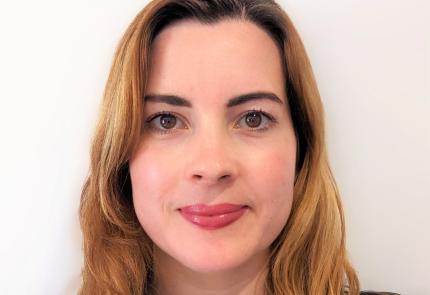We combined a realist evaluation framework with an explanatory case study design and used a cross-sectional survey, semi-structured qualitative interviews and documentary analysis as data sources. Our initial programme theory was informed by existing theories on audit and feedback, behaviour change and implementation science, such as Clinical Performance Feedback Intervention Theory (Brown et al., 2019), Theoretical Domains Framework (Michie et al., 2005) and Implementation Outcomes Evaluation Framework (Proctor et al., 2011). During my presentation I presented our logic model, ie. a visual depiction of our initial programme theory.
Q: How was the experience of presenting your research?
Similar to most researchers, I really enjoy talking about my research. It’s a topic that I am of course very passionate about. Although presenting to experts in a field such as implementation science can be daunting as an early career researcher, I found it a great experience and the follow-up questions asked by the audience were both interesting and encouraging. It was a fantastic opportunity to also talk about the more ‘nerdy’ aspects of my PhD such as the methodology around realist evaluation and the intricacies of developing a programme theory, which of course are relevant beyond my specific topic area.
Q: What were the positives / negatives of the virtual conference format in comparison with a physical conference?
I think there are always positives and negatives for both virtual and in-person conferences. A negative of virtual conferences of course being the lack of informal networking that happens over cups of tea and shared sandwiches – in fact the lack of ready-made cups of tea and sandwiches in the first place! But as mentioned above, a clear advantage to me as a PhD student was that I didn’t have to factor in a budget for travel and accommodation due to it being a virtual conference.
The virtual format also enabled me to pop in and out of various sessions depending on what projects I was particular keen to hear about – this would have likely been much more disrupting for speakers if I’d actually moved from room to room during in-person conferences. I also happened to have two other speaking commitments on the same day as this conference presentation, so the virtual nature meant that I was able to take up all of these fantastic opportunities alongside each other. Not to mention the fact that my two young children were able to briefly join the virtual award ceremony which was a lovely experience for them and for me.
Q: What were the highlights for you? Do you have any key takeaway learning?
My personal highlight was definitely winning the award and being able to share that virtual moment with my two young children. Having listened to so many other talented speakers presenting on such a broad and interesting selection of research studies was certainly another highlight – the breadth of research methods, topics, findings and impact stories that were shared on the day were incredible and really brought home the wide range of research that is implementation science. I look forward to joining again next year!
